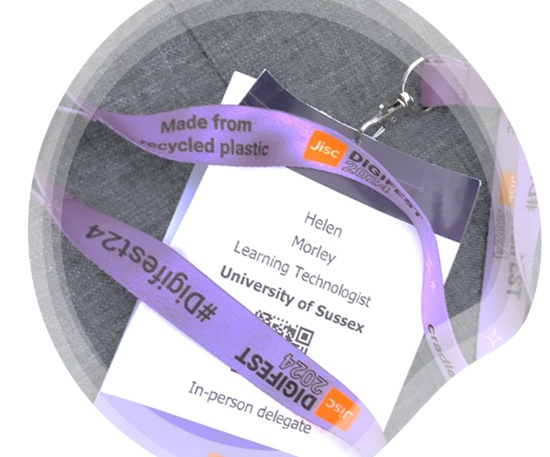by Helen Morley, Learning Technologist, University of Sussex
In March 2024 I attended the Digifest conference hosted by JISC at the ICC in Birmingham. The focus for the two days was “Imagine the Future” and the programme included sessions on virtual reality class environments, how the learner experience can be improved by gamification and – unsurprisingly – AI. Here are some reflections on my top 3 sessions:
Imagine the Future
We began with a fascinating keynote talk by Tessa Cramer, professor of Designing the Future, Fontys Applied University (the Netherlands). Cramer explained her role as a futurologist and warned us of potential pitfalls when we try to imagine what is coming next. An amusing example was that when decades ago people were encouraged to imagine how the domestic sphere might change, there were plenty of gadgets and gizmos in the imagined home but the person in the kitchen was always “mum”! The talk was far from negative though as we were shown examples of how thinking differently about what might be really does give us the opportunities to think and imagine truly creatively. Cramer’s mantra is “things can be done differently, and that takes courage” which is a challenging position to hold, but we were left with valuable advice that we remember to include rest and play in our work if we are to realise this.
AI and Empathy
Scott Hayden, head of teaching, learning and digital at Basingstoke College of Technology spoke to a packed-out breakout group about how he and his colleagues are using AI across their college. I’ve chosen this talk as one of my top three because it was such a comprehensive account of how AI can be used for different purposes across an entire institution. Hayden skipped seamlessly between examples like producing AI videos of the college’s Principal welcoming international students in their home languages – and how this then informs lessons on critical thinking about the authenticity of digital media and the college’s policy about using real people’s images and voices to create false content, chatbots editing teaching materials to make them more accessible to learners with very focused interests (maths problems explained using the mechanics of a favourite classic car), and creating a bank of AI prompts for subject specialists to use when outsourcing administration tasks to assistive technology. Basingstoke College of Technology is a secondary school with sixth form and it’s so important that we in HE have an understanding of what our future students will be used to.
Generative AI – Student Panel
I think this session is the one I have to name as my most useful. Five students, from different disciplines at different universities at different points in their academic careers, with different experiences and challenges, discussed how they and their peers are (or are not) using generative AI in their studies. The students were candid and those who make frequent use of generative AI were convincing in their reasoning. The discussion was not adversarial and all students said that they use generative AI to some extent, but it was really reassuring to hear students talk about fairness, equal access to resources, the need to be able to evaluate and make good use of AI output, accessibility and how AI supports them to manage diverse needs, and integrity. Best of all, the panel spoke of how they value the input from their tutors more than that of the machines. I would be interested to hear from students at Sussex on the same topic.
Other sessions I found particularly interesting included:
- Using student data to support a more personalised learning experience (Carmen Miles, De Montfort University; Richard Floyd and Ben Gill, Lancaster University).
- Culture shock to digital shock: understanding international students’ digital experience (Sharon Perera, University of Greenwich; Tom Wright, University of Lincoln; Vartika Khandelwal, UKCISA student ambassador; Elizabeth Newall, Jisc).
- AI 2030 (Michael Webb, director of technology and analytics, Jisc).
Jisc is sourcing content for Digifest 2025 – if there’s something you’re working on that you’d like to have considered, or you’d like to be kept up-to-date, complete the form here https://www.jisc.ac.uk/digifest or email the Educational Enhancement team on ee@sussex.ac.uk.




[…] Discussions around AI at a national conference (Helen Morley) […]